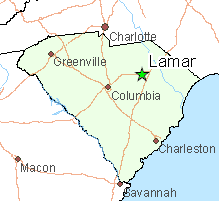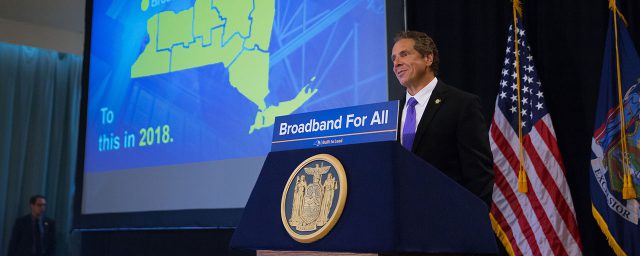 The Federal Communications Commission (FCC) has proposed a new policy allowing cable companies to deduct the fair market value of their obligations to serve the public interest from franchise fee payments to towns and cities.
The Federal Communications Commission (FCC) has proposed a new policy allowing cable companies to deduct the fair market value of their obligations to serve the public interest from franchise fee payments to towns and cities.
The proposal, MB Docket No. 05-311 — Cable Franchise Fee Deduction, will turn cable franchise laws upside down in virtually every state, reducing local government revenue and threatening public, educational, and government (PEG) access channels, access to cable in schools and other educational institutions, and undermining local control over the placement of wireless cell equipment and other infrastructure that some cable operators propose to install.
Critics of the proposal claim it would continue a concerted effort to shift oversight and regulatory controls away from local communities and states to a federal government that currently has a policy of favoring the interests of telecommunications companies over the interests of community leaders and the public.
Concord, Calif. Mayor Edi Birsan warned the FCC that if it adopts its proposal, it would strip his city, along with others, of its ability to manage where cable companies place cellular equipment and at what price.

Birsan
“Local governments may lose their authority to manage a cable company’s deployment of non-cable facilities, such as ‘small cells,’ Birsan wrote in a letter to the FCC. “This preemption would threaten to extend to fees for use of the rights of way, meaning:
- Cable companies can use local rights of way for any purpose, regardless of the terms of the franchise, and avoid having to pay fair compensation to the local government for the use of publicly funded assets in the rights of way.
- Cable companies could potentially install “small wireless facilities” with little to no public input, without having to meet any aesthetic or equipment size requirements aimed to mitigate blight and preserve community character.
- Cable companies would gain a significant advantage against their competitors, including telecommunications providers even though the FCC has just adopted an order lowering their deployment standards, resulting in a race-to-the-bottom deployment strategy for both cable and telecommunications companies.”
Officials in King County, Wash., which includes the city of Seattle, were critical and suspicious of the FCC’s argument that the burdens of providing benefits to communities as defined in franchise agreements are slowing down the deployment of broadband services, a claim Tanya Hannah, chief information officer of the Department of Information Technology and Christina R. Jaramillo, manager of the Office of Cable Communications found had little merit and no evidence to back it.

Hannah
“It is not obvious that if a cable operator’s profit increases by one dollar that the operator will invest an additional dollar in broadband infrastructure deployment,” they wrote in a joint letter to the FCC. “Many cable companies are functional monopolies. Because the data transfer speed of fiber-line cable systems significantly exceeds the speed of wireless systems, cable broadband is the preferred broadband service if the prices for other broadband services are comparable.”
The two officials made it clear that since the FCC was proposing to impose these changes retroactively on town and cities around the country, the result would be detrimental to local government finances.
“If the FCC were to allow the value of the proposed franchise fee offset activities that were done in the past to be deducted from current or future franchise fee payments, the results to local governments would be debilitating,” the officials wrote. “It could essentially end all monetary fee payments to King County by Comcast and WAVE Broadband for a number of years. This is not a feasible option. It is not realistic and it is not fair.”
The Alabama League of Municipalities told the FCC the issue was about basic state sovereignty, and Alabama does not want the federal government to run its affairs.
“Section 220 of the Alabama Constitution of 1901 provides that no person, firm, association, or corporation shall be authorized or permitted to use the streets, avenues, alleys, or public places of any city, town, or village for the construction or operation of any public utility or private enterprise without first obtaining the consent of the proper authorities of such city, town, or village,” the League wrote. “The Supreme Court of Alabama has labeled this grant of authority as ‘an essential and sovereign power in local authorities […] in the nature of a bill of rights [that] recognize certain fixed constitutional rights which shall not be invaded.'”
 Under the FCC’s proposal, Alabama’s Constitution would be violated by allowing cable operators near carte-blanche access to public rights-of-way without fair compensation or permission, the League argued.
Under the FCC’s proposal, Alabama’s Constitution would be violated by allowing cable operators near carte-blanche access to public rights-of-way without fair compensation or permission, the League argued.
For a lot of communities, any reduction in franchise fee payments will lead to a corresponding decrease in funding for PEG television services.
“Our town’s ability to invest and support its public access television unit and the telecommunications curriculum in our schools is directly linked to the funding received from Charter Communications as part of the franchise fee (“cable tax”) agreement,” noted Robert J. Oliveira, chairperson of the Westport, Mass. Cable Advisory Board. “Any reduction in these funds would mandate a corresponding reduction in programming levels and information access to the community and curriculum support to our students.”
Public comments are due to the FCC by the end of today — Wednesday, Nov. 14. Consumers can share their opinions by visiting the docket on the FCC’s website, and then selecting + Express on the left hand side of the page, which will open an online comment form. Municipalities can file formal submissions using the + New Filing link.
 Population growth in South Carolina has opened up new opportunities for Charter Communications to extend cable service into areas that were formerly too unprofitable to serve. On Tuesday, the company announced a $1 million construction project to bring Spectrum cable broadband service to the town of Lamar in Darlington County.
Population growth in South Carolina has opened up new opportunities for Charter Communications to extend cable service into areas that were formerly too unprofitable to serve. On Tuesday, the company announced a $1 million construction project to bring Spectrum cable broadband service to the town of Lamar in Darlington County. “Internet is obviously a necessity, it’s not a luxury anymore,” said Ben Breazeale, senior director of government affairs for Charter Communications. “Rural communities all over our country are struggling to try to retain young people and internet is a must. Access to our communications systems is a must for our youth.”
“Internet is obviously a necessity, it’s not a luxury anymore,” said Ben Breazeale, senior director of government affairs for Charter Communications. “Rural communities all over our country are struggling to try to retain young people and internet is a must. Access to our communications systems is a must for our youth.”

 Subscribe
Subscribe Cable companies continue to dominate the U.S. broadband marketplace, and the gap between cable broadband and telephone company DSL continues to widen.
Cable companies continue to dominate the U.S. broadband marketplace, and the gap between cable broadband and telephone company DSL continues to widen. The Federal Communications Commission (FCC) has proposed a new policy allowing cable companies to deduct the fair market value of their obligations to serve the public interest from franchise fee payments to towns and cities.
The Federal Communications Commission (FCC) has proposed a new policy allowing cable companies to deduct the fair market value of their obligations to serve the public interest from franchise fee payments to towns and cities.

 Under the FCC’s proposal, Alabama’s Constitution would be violated by allowing cable operators near carte-blanche access to public rights-of-way without fair compensation or permission, the League argued.
Under the FCC’s proposal, Alabama’s Constitution would be violated by allowing cable operators near carte-blanche access to public rights-of-way without fair compensation or permission, the League argued. Cisco is helping cable operators get ready to finally end the wide speed disparity between upload and download speeds offered by most cable operators.
Cisco is helping cable operators get ready to finally end the wide speed disparity between upload and download speeds offered by most cable operators. Charter Communications’ ongoing settlement talks with the New York Public Service Commission are “productive” and will likely result in a final settlement agreement allowing Spectrum to continue operating in New York.
Charter Communications’ ongoing settlement talks with the New York Public Service Commission are “productive” and will likely result in a final settlement agreement allowing Spectrum to continue operating in New York.

